Aloe vera is renowned for its skin healing effects, providing hydration and relief from irritation. This article explores its benefits for various skin conditions, including sunburn and acne, and highlights its applications in skincare products. Additionally, we will discuss the unique compounds that enhance its effectiveness and offer tips for optimal use.
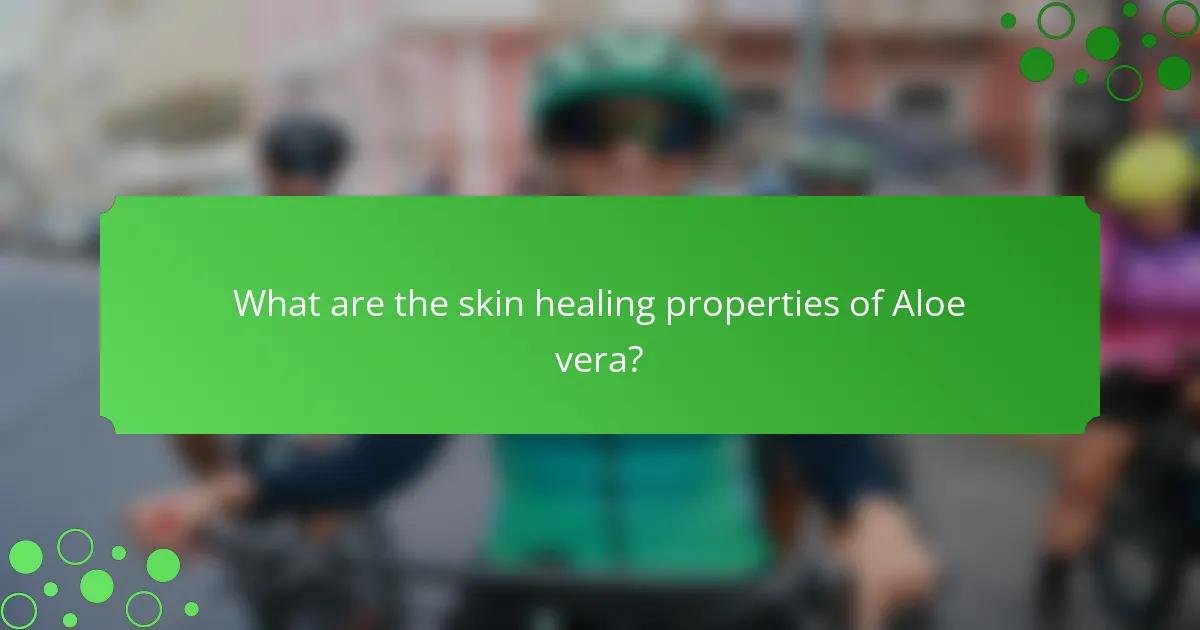
What are the skin healing properties of Aloe vera?
Aloe vera has significant skin healing properties, including soothing irritation, reducing inflammation, and promoting wound healing. Its gel contains compounds like aloin and acemannan that aid in skin repair. Aloe vera can hydrate the skin, making it effective for dry or sunburned skin. Additionally, its antimicrobial properties help prevent infections in minor cuts and abrasions. Regular application can improve skin elasticity and overall appearance, making it a popular choice in skincare products.
How does Aloe vera promote skin regeneration?
Aloe vera promotes skin regeneration primarily through its rich nutrient profile and healing properties. It contains vitamins, minerals, and enzymes that stimulate cell turnover and repair damaged skin. The polysaccharides in aloe vera enhance moisture retention, facilitating healing and reducing inflammation. As a result, aloe vera is effective for treating burns, cuts, and other skin ailments. Its unique ability to penetrate the skin deeply allows for faster regeneration compared to many other natural remedies.
What compounds in Aloe vera contribute to its healing effects?
Aloe vera contains compounds like polysaccharides, glycoproteins, and vitamins that contribute to its healing effects. Polysaccharides, such as acemannan, enhance skin hydration and promote tissue repair. Glycoproteins facilitate healing by reducing pain and inflammation. Vitamins A, C, and E provide antioxidant properties, protecting skin cells from damage.

Which skin conditions can Aloe vera effectively treat?
Aloe vera effectively treats various skin conditions, including sunburn, acne, eczema, psoriasis, and minor wounds. Its anti-inflammatory properties reduce redness and promote healing. Aloe vera’s unique attribute is its high content of polysaccharides, which enhance skin hydration and repair. Studies show it can significantly improve skin moisture levels and elasticity.
How does Aloe vera help with sunburn relief?
Aloe vera provides effective sunburn relief due to its soothing and hydrating properties. The gel from the plant contains compounds like aloin and acemannan, which promote skin healing and reduce inflammation. Aloe vera’s unique attribute is its ability to cool the skin, offering immediate comfort. Additionally, it can help replenish moisture lost from sun exposure, aiding in the recovery process. Regular application can enhance skin repair and prevent peeling, making it a valuable remedy for sunburn.
What role does Aloe vera play in acne treatment?
Aloe vera effectively aids in acne treatment through its anti-inflammatory and antibacterial properties. It reduces redness and swelling while promoting skin healing. The gel contains compounds like aloin, which have antimicrobial effects, helping to prevent acne breakouts. Additionally, its moisturizing attributes prevent dryness that can result from acne medications. Regular application can lead to improved skin texture and reduced scarring.
Can Aloe vera assist in managing eczema symptoms?
Yes, Aloe vera can assist in managing eczema symptoms. Its anti-inflammatory properties help soothe irritated skin and reduce redness. Aloe vera contains polysaccharides that promote skin hydration and healing. Additionally, it has antimicrobial effects that may prevent infections associated with eczema. Regular application can enhance skin barrier function, providing relief from dryness and discomfort.
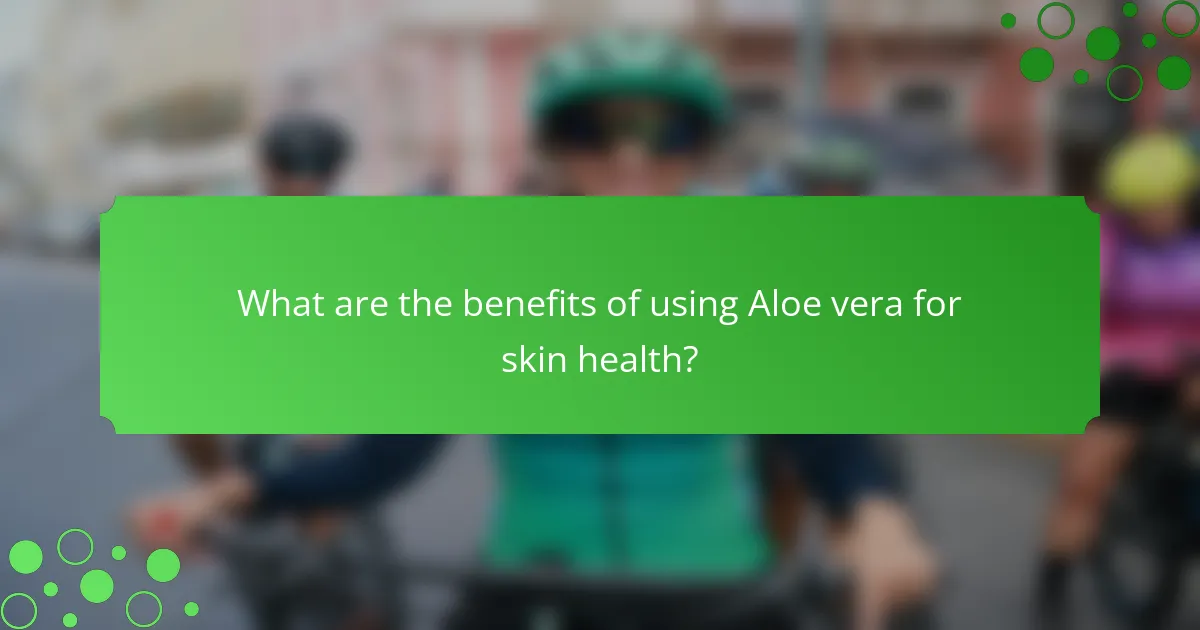
What are the benefits of using Aloe vera for skin health?
Aloe vera offers numerous benefits for skin health, including hydration, healing, and anti-inflammatory properties. It is rich in vitamins, minerals, and antioxidants that promote skin rejuvenation.
One significant benefit is its ability to soothe sunburns and minor burns, providing relief and accelerating healing. Aloe vera’s moisturizing properties help maintain skin elasticity and prevent dryness, making it suitable for all skin types.
Additionally, it can reduce acne and blemishes due to its antibacterial qualities. Regular application of Aloe vera can lead to improved skin texture and a more radiant complexion.
The unique attribute of Aloe vera is its gel-like consistency, which allows for easy absorption and instant hydration upon application.
How does Aloe vera hydrate and moisturize the skin?
Aloe vera hydrates and moisturizes the skin through its high water content and beneficial compounds. It contains polysaccharides that attract moisture and form a protective barrier. This barrier prevents water loss while delivering essential nutrients. Aloe vera’s unique attribute is its ability to soothe inflammation, enhancing skin healing. Regular application can improve skin elasticity and overall hydration levels.
What are the anti-inflammatory effects of Aloe vera on the skin?
Aloe vera exhibits significant anti-inflammatory effects on the skin. It contains compounds like anthraquinones and glycoproteins that reduce inflammation and promote healing. Studies show that aloe vera can alleviate conditions such as acne, eczema, and psoriasis by soothing irritated skin and accelerating cell regeneration. Its unique ability to hydrate while providing anti-inflammatory benefits makes it a valuable ingredient in skincare products.
How does Aloe vera enhance skin elasticity and firmness?
Aloe vera enhances skin elasticity and firmness by promoting collagen production and providing hydration. Its unique polysaccharides support skin structure, while vitamins and antioxidants protect against aging. Regular application can lead to visibly firmer skin.
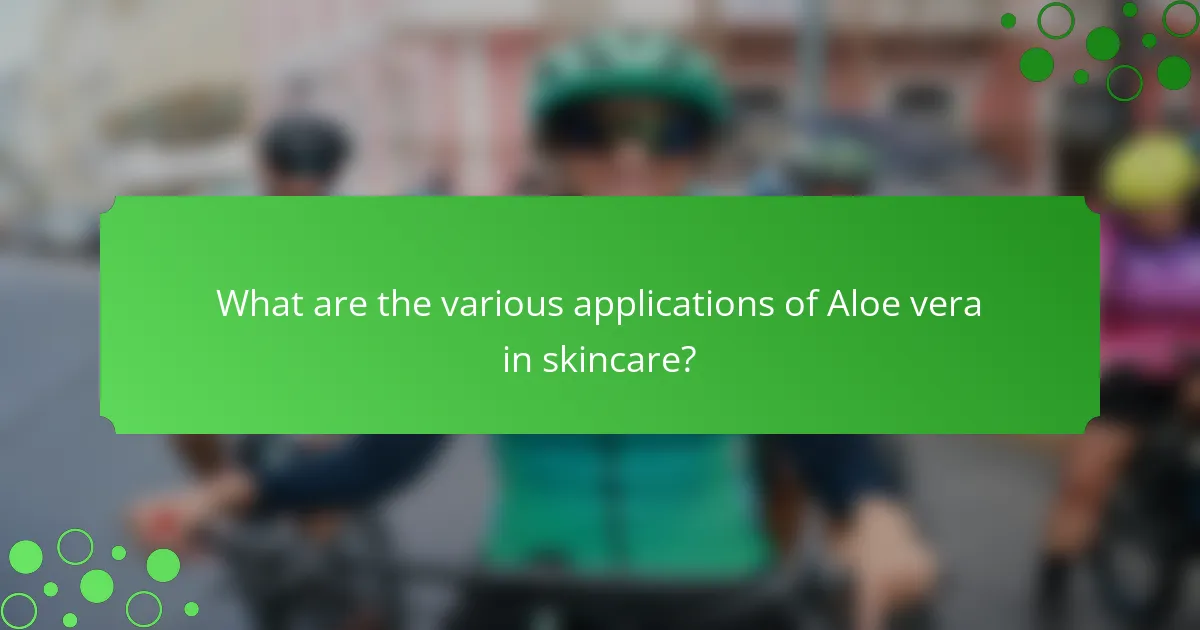
What are the various applications of Aloe vera in skincare?
Aloe vera has numerous applications in skincare due to its skin healing effects and benefits. It is widely used for moisturizing, soothing sunburns, reducing acne, and promoting wound healing.
Aloe vera gel is a popular choice for hydration, as it contains 99% water and essential vitamins. Its anti-inflammatory properties help calm irritated skin and reduce redness. Additionally, the antioxidants in aloe vera protect the skin from environmental damage.
Aloe vera is also effective in treating minor cuts and burns. Its unique ability to stimulate collagen production aids in skin repair. Furthermore, it is often found in various skincare products, including creams, lotions, and masks, enhancing their efficacy.
In summary, aloe vera’s versatility in skincare stems from its root attributes of hydration and healing, making it a valuable ingredient for various skin concerns.
How can Aloe vera be incorporated into daily skincare routines?
Aloe vera can be easily incorporated into daily skincare routines through various methods. Applying pure aloe vera gel directly onto the skin provides hydration and promotes healing. Using aloe vera-infused moisturizers enhances skin nourishment. Mixing aloe vera with essential oils can create soothing serums for targeted treatments. Additionally, incorporating aloe vera in homemade face masks can boost skin rejuvenation. Regular use of aloe vera helps improve skin texture and reduces inflammation.
What are the different forms of Aloe vera for topical use?
Aloe vera for topical use comes in several forms, including gel, cream, lotion, juice, and ointment. Each form offers unique benefits for skin healing.
Aloe vera gel is the most common, known for its soothing and hydrating properties, making it ideal for sunburns and minor cuts. Creams and lotions often contain additional moisturizing ingredients, enhancing skin hydration and elasticity. Aloe vera juice can be applied topically to promote healing and reduce inflammation. Ointments usually combine aloe with other healing agents for targeted relief.
These forms vary in concentration and efficacy, allowing users to choose based on their specific skin needs.
How does Aloe vera compare to other natural skin remedies?
Aloe vera is often more effective than other natural skin remedies due to its unique combination of healing properties. Its gel contains vitamins, minerals, and antioxidants that promote skin repair and hydration. Compared to alternatives like honey or coconut oil, Aloe vera offers faster absorption and a cooling effect, making it ideal for soothing sunburns and minor burns. Additionally, its anti-inflammatory properties can reduce redness and swelling more efficiently than many other natural options.
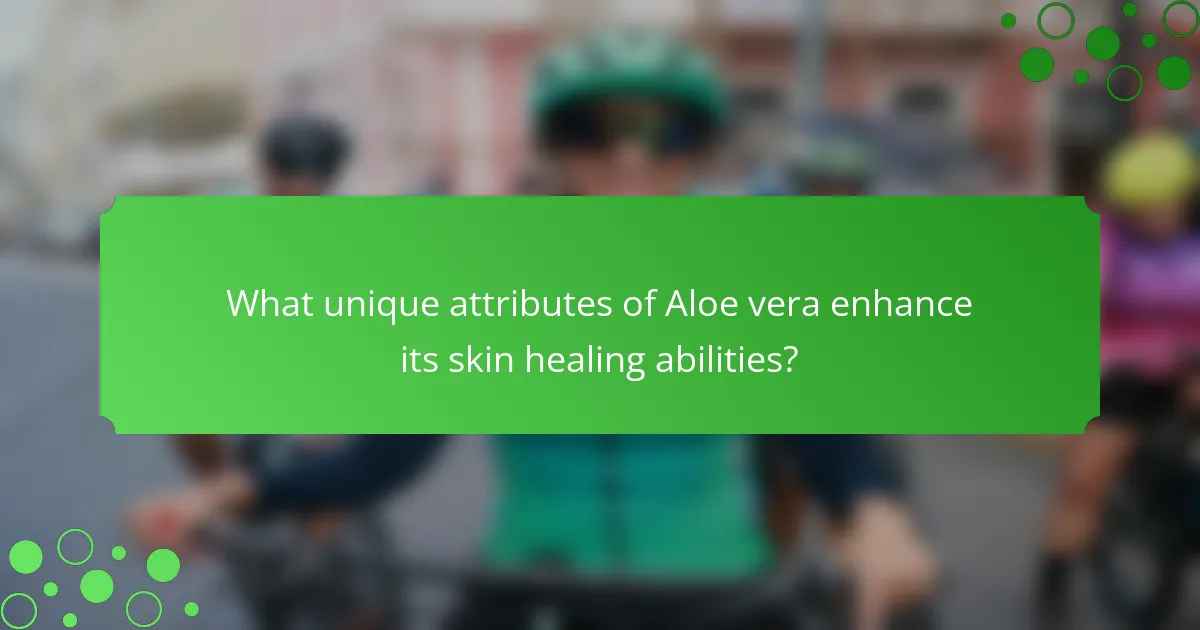
What unique attributes of Aloe vera enhance its skin healing abilities?
Aloe vera contains unique attributes that significantly enhance its skin healing abilities. One key component is aloin, which possesses anti-inflammatory properties that reduce redness and swelling. Additionally, the presence of vitamins C and E promotes skin repair and rejuvenation. The polysaccharides in aloe vera, particularly acemannan, aid in hydration and stimulate cell growth, further accelerating the healing process. Lastly, its antimicrobial properties help prevent infections, making it effective for treating minor cuts and burns.
How does the purity of Aloe vera gel impact its effectiveness?
The purity of Aloe vera gel significantly influences its effectiveness for skin healing. Higher purity levels enhance the gel’s natural properties, leading to better moisture retention and faster healing.
Pure Aloe vera gel contains more active compounds, such as vitamins, enzymes, and amino acids, which promote skin repair. For instance, gels with at least 95% purity are more effective in soothing burns and reducing inflammation compared to lower purity options.
Additionally, impurities can lead to skin irritation or allergic reactions, diminishing the gel’s healing benefits. Therefore, selecting high-purity Aloe vera gel ensures optimal results for skin applications.
What are the benefits of using organic Aloe vera products?
Using organic Aloe vera products offers numerous skin healing benefits, including hydration, soothing effects, and anti-inflammatory properties. Aloe vera is rich in vitamins, enzymes, and amino acids that promote skin repair. Its unique attribute is the ability to penetrate skin layers effectively, enhancing absorption of nutrients. Regular application can improve skin elasticity and reduce signs of aging. Additionally, Aloe vera’s rare attribute of being suitable for all skin types makes it a versatile choice for natural skincare.
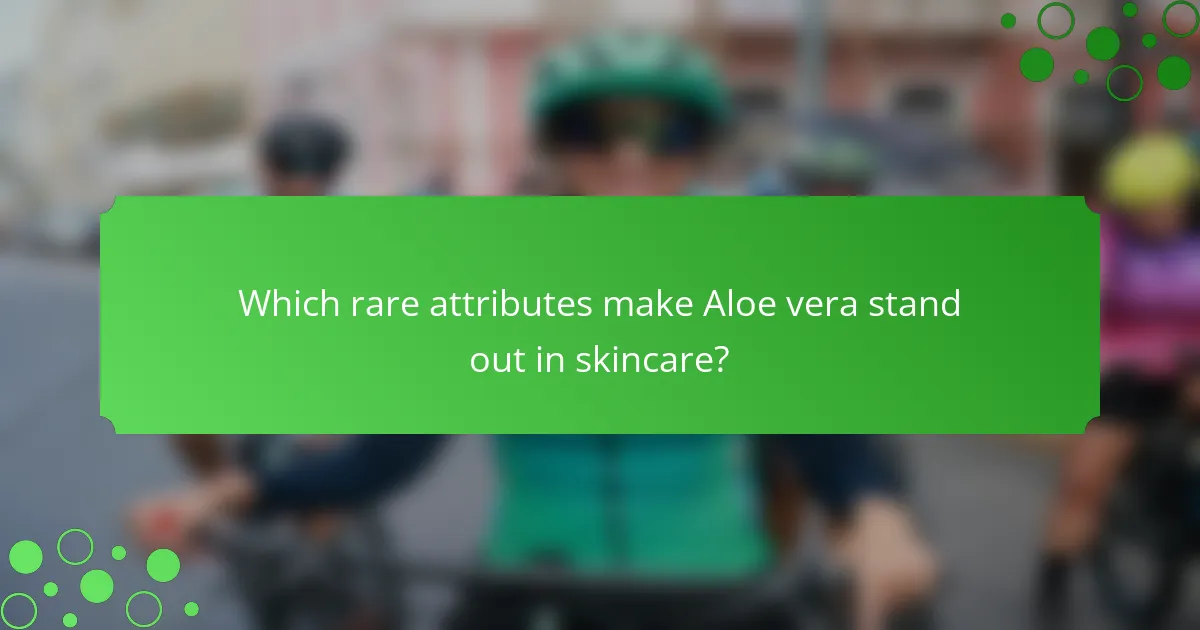
Which rare attributes make Aloe vera stand out in skincare?
Rare attributes that make Aloe vera stand out in skincare include its unique ability to penetrate the skin deeply, promoting hydration at a cellular level. Additionally, Aloe vera contains rare enzymes that aid in exfoliation, enhancing skin texture. Its polysaccharides have anti-inflammatory properties, providing relief from skin irritations. Lastly, Aloe vera’s unique glycoproteins help reduce the appearance of scars and promote healing, distinguishing it from other skincare ingredients.
What are the lesser-known benefits of Aloe vera for skin rejuvenation?
Aloe vera offers several lesser-known benefits for skin rejuvenation. It promotes collagen production, enhancing skin elasticity and reducing wrinkles. Aloe vera contains antioxidants that combat free radicals, helping to prevent premature aging. Its anti-inflammatory properties soothe irritated skin, making it effective for conditions like acne and eczema. Additionally, aloe vera can improve skin hydration, leading to a more youthful appearance. Finally, its natural antibacterial qualities help prevent infections, supporting overall skin health.
How does the geographic origin of Aloe vera influence its properties?
The geographic origin of Aloe vera significantly influences its properties, including its skin healing effects. Different regions yield varying concentrations of active compounds like aloin and acemannan, which enhance its effectiveness. For example, Aloe vera from the Caribbean is known for higher aloin levels, promoting stronger anti-inflammatory benefits. Additionally, climate and soil conditions affect the plant’s growth, impacting its overall therapeutic applications. Regions with drier climates often produce more potent varieties, leading to enhanced skin healing properties.
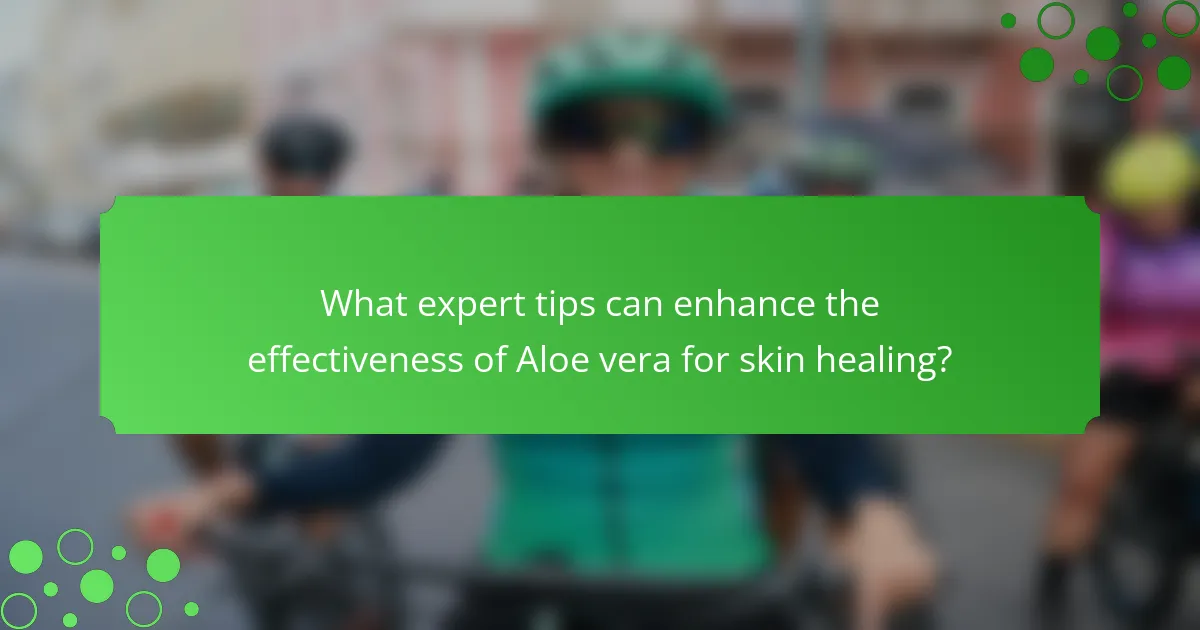
What expert tips can enhance the effectiveness of Aloe vera for skin healing?
To enhance the effectiveness of Aloe vera for skin healing, apply it directly to the affected area and use it consistently. Select high-quality, pure Aloe vera gel for maximum benefits.
1. Clean the skin thoroughly before application to remove dirt and impurities.
2. Apply a generous amount of Aloe vera gel and gently massage it into the skin.
3. Allow the gel to absorb fully, preferably leaving it on overnight for optimal healing.
4. Repeat this process daily to promote skin regeneration and hydration.
Aloe vera contains unique compounds like polysaccharides that accelerate healing and reduce inflammation.
What common mistakes should be avoided when using Aloe vera?
Avoiding common mistakes when using Aloe vera enhances its skin healing benefits. First, do not apply Aloe vera on open wounds or deep cuts, as it may cause irritation. Second, avoid using products with added chemicals, which can diminish its natural healing properties. Third, do not rely solely on Aloe vera for severe skin conditions without consulting a healthcare professional. Lastly, ensure proper storage to maintain its potency; exposure to heat or sunlight can degrade its effectiveness.
How can Aloe vera be combined with other ingredients for optimal results?
Aloe vera can be combined with honey, coconut oil, and tea tree oil for enhanced skin healing effects. Honey provides antibacterial properties, while coconut oil moisturizes and nourishes the skin. Tea tree oil adds anti-inflammatory benefits, making this combination effective for acne and irritation. Each ingredient contributes unique attributes that amplify aloe vera’s natural healing abilities.